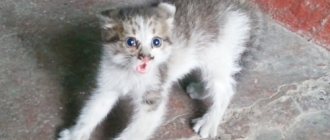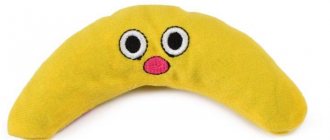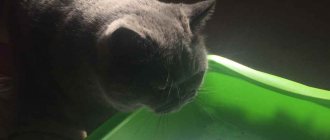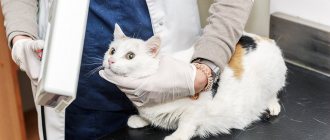Home Animals Cats
Why are cats afraid of cucumbers? It just so happened that, despite all his pride, the cat is a cowardly creature, which is why he became the main character of a huge number of comedy videos. It’s not without reason that it’s these kinds of videos that almost always get the most views, since such a favorite ranks first in popularity and is found in almost every home. But what is the reason for his such noticeable fear? Can the most ordinary cucumber really cause such vivid horror in a benevolent animal? To answer this question, you will need to understand the basis of such incidents, highlighting all the characteristics and psychology of the pet itself.
Who said cats are afraid of cucumbers?
You hear so much from pet owners: either dogs eat lecho from cans on the table, or cats play with imaginary invisible friends! Owners love to come up with various amusing stories about their pets, most of which are either invented or embellished facts.
Some don’t stop at stories, but also film their pets. So, one day an interesting video appeared on the Internet, and behind it were many similar stories: a cat calmly leaned over his bowl and was eating, the owner quietly came up behind him and put a long cucumber.
When a cat notices a vegetable, something incredible happens - it jumps to the side, rushes chaotically around the room/apartment, its fur stands on end, its tail becomes a pipe.
The conclusion of the owners of domestic cats who have undergone similar experiments: all cats are afraid of cucumbers! It would seem like a fact proven in practice, but is it really so?!
How did people know that cats are afraid of cucumbers, and do they always react this way to vegetables?
Why are cats afraid of cucumbers?
After the first video that appeared on the Internet, where an animal was scared of a vegetable, most people wanted to test their pets' endurance. During similar experiments, it was found that not every cat is afraid of green vegetables. There were those who made it clear that they absolutely did not care.
For your information! Statistics say that the bravest cats live in the Russian Federation. But professionals deny such options, because the reaction of any cat to cucumbers is special, and it is based on the character of the animal, and not on the nation or place of residence.
Is it possible to fight fear?
To avoid harm to the cat's mental health, the pet owner should try in a calm environment to help his pet overcome his fear of cucumbers. To do this, you don’t need to suddenly take them out. You need to put the cat on your lap, pet him, show him this green vegetable. You should calmly talk to the animal, let it smell the cucumber, play with it, bite it, taste it.
In a calm environment, a cucumber will not cause a feeling of fear in a cat.
When the cat becomes familiar with this vegetable, he will no longer be afraid of it and will not experience stress from its unexpected appearance. On the contrary, such familiarity with the subject has a positive effect on the animal’s psyche. It is important not to force the cat to perform any actions when introducing it to a cucumber. If he is afraid and does not want to approach the vegetable, you just need to leave it on the floor. Perhaps, over time, the cat itself will become interested in the object that initially caused its fear, and will want to get to know it.
If your pet continues to be afraid of a cucumber, you should limit its ability to see this vegetable.
Is there anything I can do to help overcome this fear?
Of course you can. It is enough to put the cat in your arms, without holding it like in a vice, and show him the vegetable. At this moment, the animal should be stroked and calmed. The goal is to introduce your pet to the cucumber, allow it to smell it and touch it with its paw.
If the cat doesn’t even want to see the vegetable, you can leave it on the floor and walk away. As time passes, the pet will understand that the cucumber is not dangerous and will approach it. But if, even after these steps, the cat does not approach the cucumber, you need to remove it and not show it again. Cats and cucumbers, in this case, are incompatible things.
You can try to overcome the animal's fear
Experts do not advise experimenting on your pet. Of course, this is fun and interesting to watch, but it is dangerous for the health of the animal. Therefore, it is not worth the risk.
Why does cucumber scare domestic cats?
Of course, after watching a dozen similar videos, I just want to record the fear of cucumber as one of the phobias of domestic cats, and recognize this as a scientific fact. Sorry, it won't work.
Having carefully studied the opinions of experts (cat breeding specialists, veterinarians, etc.), as well as the experience of some acquaintances in this matter, we were able to identify several reasons for a cat’s fear when the most ordinary cucumber appears in its field of vision:
Novelty effect
It’s not a matter of a cucumber; in fact, everything is much more global: the cat is afraid not so much of a cucumber as of a new object that unexpectedly appeared on its territory. And such a violent reaction to it is explained by the fact that cats do not really like these same surprises, having become accustomed to controlling what is happening around them.
Response to a probable threat
The fear that a cat may seem to be experiencing is not a phobia, but an adequate reaction (natural instinct) to a possible threat/danger, the so-called “start reflex”.
When it is triggered, the animal tries to instantly run away, and then, from a long distance, assess the situation and the likelihood of a threat. In this case, the cucumber may remind the cat of a snake or other natural threat.
Reduced vigilance while eating
At the moment the cucumber appears, the cat’s vigilance is weakened: everyone knows that the place where the cat eats is the safest for it, and while eating it is in the most relaxed state and does not expect any threat.
Therefore, the protective reflex can be triggered by almost any object that appears unexpectedly at that moment.
Previously, animals were intimidated with this cucumber
Also, one of my attentive and meticulous friends noticed that in the videos with cats, in some cases, vegetables were bitten and there were traces of scratches on them. This led us to believe that they had already been “used” for something.
It is quite possible that the owner had previously intimidated the animal with this same cucumber, and therefore the cat’s reaction is not surprising, but quite understandable and justified.
Unstable character of the cat
These reasons are complemented by one more - in the case of people, we would say “human factor”. That is, the reason may be in a specific cat, and not in the owner or the object that caused the fright.
A pet may have an unbalanced character, nervous, and a heightened reaction to everything that happens. And in this case, in addition to the unexpected appearance of a cucumber, many events can frighten him.
Why are cats afraid of loud and strange sounds?
Most cats are very cautious and afraid of many things. If they experience fear for a long time, then this is real stress for them. Sooner or later, this condition can lead to aggression and nervous breakdown. Those who have cats at home should not create additional phobias for their pets and scold the animal for strange behavior.
Indeed, cats are frightened by loud, sharp and incomprehensible sounds. This is probably their biggest phobia. If a cat lives in the house, then it is afraid when a hair dryer or vacuum cleaner, mixer or electric drill is working. A cat may be frightened by thunder, fireworks, a doorbell, or a car alarm.
Most often, upon hearing some loud and incomprehensible sound, cats try to hide and sit out in their “secluded” place. Then they leave as if nothing had happened. You should not try to get the cat out at this moment. She will be even more scared. Some cats are afraid not of the sound, but of the object that can make it. In this case, the cat does not run away or hide, but attacks the “enemy” who makes the sound. This is an attempt not only to protect oneself, but also to show who is boss in the house.
Possible reasons
It turns out it wasn't a cucumber secretly placed behind the cat, but almost anything that sneaks up on the animal can terrify it.
If you watch these videos carefully, you will notice that vegetables are deliberately left behind by pets as they peacefully enjoy their food with their head buried in a bowl of food or water. It should be said that cats eat only when they are sure that nothing threatens them. In other words, cats perceive their feeding stations as places that are completely safe and secure. Thus, when a cat notices a green cucumber lying on the floor behind it, it freaks it out, because it does not expect that there will be a foreign object behind it.
"I think the reaction is due to the novelty and surprise of finding an unusual object secretly placed while their heads were lowered into the food bowl," says Dr Roger Mugford, an animal behaviourist. Cats don't usually find cucumbers lying on the floor, so the sheer novelty of it all drives them crazy.
Alternative opinion or “Russian cats are not afraid of cucumbers”
It’s interesting that many of those who couldn’t resist checking their pet were surprised that not all cats are afraid of cucumbers. Some of them react not only calmly, but even begin to play with them, dragging them from corner to corner throughout the apartment.
Such a moment indicates that the video about cats and cucumbers, which became so widespread on the Internet, could have turned out to be just a successful selection of jokes.
And due to the fact that most of the owners whose pets confirmed the absence of a “cucumber phobia” were from Russia, another interesting hypothesis appeared, claiming that Russian cats are not afraid of cucumbers. Although in fact, among domestic cats there are also those who are no less frightened of vegetables than their foreign tailed brothers.
Why are cats afraid of cucumbers?
Videos of “cats and cucumbers” on the Internet instantly become viral. Owners from all over the world place vegetables behind their pets' backs while they eat and point their cameras. Cats' reaction to cucumbers is worth thousands of likes. But why does this still happen?
Scientists believe that the point here is not that cats are afraid of cucumbers. If you place a banana, zucchini or other elongated object, the reaction will be the same. One of the most popular explanations is the similarity in shape to a snake. This version is shared by animal psychologist Jill Goldman, who specializes in the behavior of cats and dogs. She explains the cats' reaction to the cucumber by saying that snakes are one of the biggest dangers that awaited cats before they were domesticated by humans. (Read our material about how this happened and how other animals were domesticated.)
Current
- 17th-century letters read using dental x-rays without printing them
- Scientists have recorded the first ever space hurricane over the North Pole
- A man survives after a two-hour fight with a crocodile
However, veterinarian, zoopsychologist and felinologist Angelina Sirotina is sure that this is not why cats are afraid of cucumbers. According to her, the animal is guided not only by vision, but also by other senses, and if an enemy appeared behind it, it would probably smell it and turn around. Otherwise, the cats simply would not survive. Consequently, they have no fear of elongated objects. Moreover, there is no fear directly of cucumbers. It’s just that the one who first decided to conduct such an experiment came across a cucumber. In its place, there could well be, for example, an eggplant, and then it would appear in the videos.
Imagine: you finish your tea, turn around and see a huge plush mouse right in front of you!
Angelina Sirotina notes that the reason lies not in the object, but in the circumstances under which the cat encounters it. Are cats afraid of cucumbers? Not at all. “The cat was taken by surprise. She was focused on something completely different and didn’t expect any trick, but then something strange happens: suddenly they slip her a cucumber. The unexpected appearance of an object can frighten any other animal, including a dog. And even a person,” notes the felinologist. In the “cat and cucumber” scene, you can quite imagine other participants.
British animal behaviorist Roger Mugford also believes that the reason is surprise and a pet may be afraid not only of a cucumber or banana, but also of a plastic fish, a mask or any other unfamiliar object. And the form has nothing to do with it. Cats are generally suspicious of any innovations, and cucumbers usually don’t lie on the floor. No wonder the cat is afraid of cucumbers. This reaction is a reflex to something new. This is also noted by Jill Goldman. She is sure that assessing potential danger is much easier and safer from a distance. That’s why the cats jump first, and then figure out what it is that’s there. (And by the way, no matter how funny cats jump, they always land confidently. In this regard, scientists also conducted an experiment and told why cats always land on all four paws.)
Some owners stubbornly try to prove that the animal’s reaction is directly related to the nationality of the cat owner
Another version of why cats are afraid of cucumbers: for animals, the place where they eat is a comfort zone, as Pam Johnson-Bennett, author of the book “Think Like a Cat,” explains. And in the video, the owners add the vegetable just during the meal. Now imagine: you finish your tea, turn around and see a huge plush mouse right in front of you! It is quite possible that you will jump too, and by the way, the mouse may be real! By the way, do you know why cats bring caught mice to their owners?
At the same time, not all cats are afraid of cucumbers, and some owners stubbornly try to prove that the animal’s reaction is directly related to the nationality of the cat’s owner. Like, Russian cats are not afraid of cucumbers. But Angelina Sirotina believes that the point is receptivity: the more emotional the animal, the more violent its reaction will be. Some may jump out of surprise and run away, huddling under the sofa, while others will begin to study the find with interest. This is how funny videos and queries appear on the Internet: how cats are afraid of cucumbers.
Experts agree on one thing: such experiments are very stressful for pets, and treating them this way is inhumane. And instead of cruel experiments, it is better to show them unfamiliar objects more often, helping them explore the world.
Previously, My Planet wrote about why cats stretch so often.
What are the causes of fear of cucumbers in cats?
Scientists were able to establish the exact reasons why cats reacted so violently to the appearance of a completely harmless green vegetable in their field of vision.
A cucumber is a completely new item for a cat.
Cats like to be in control, and they don't like it at all when some strange object appears on their territory. Any surprise can cause fear in an animal, which is why the pet reacts so violently to a cucumber, which, in its opinion, appeared literally out of nowhere. So in this case, cucumbers have nothing to do with it. Even if you put any other oblong object instead of a green vegetable, then most likely the cat will be scared of him too.
The cat perceives the cucumber as a threat
Cats always jump away sharply when they notice some kind of danger. This is a normal reaction of the body, called the start reflex. Animals prefer to first be as far as possible from the object that causes them fear, and only then evaluate the current situation. So an ordinary cucumber may well seem like a snake or any other dangerous creature to a cat.
When eating, the pet relaxes its vigilance
While eating food, the cat is completely relaxed, all its attention is focused on food. For her, the place to eat is considered the safest in the whole house. The animal does not expect an attack from the outside or the sudden appearance of strange objects. That's why your pet reacts so inappropriately to a cucumber or any other thing that you put next to it while it was eating.
Fear of strong odors in cats
It is known that cats have a very developed sense of smell. It helps them in different life situations. Cats do not like strong odors, as this can negatively affect the cat's receptors. They are simply afraid of losing their ability to smell the smells around them. Experts do not call this a phobia, but a defensive reaction to a factor threatening the cat. Cats don't like:
- the aroma of citrus fruits, which is considered a powerful allergen for cats that can scare them away;
- all perfumed products. From shampoos and soaps to eau de toilette and deodorants;
- scented products used in construction (paints, glue, etc.). These are very strong smells for cats;
- medicines that have a smell, alcohol, vinegar. Cats also perceive them as strong irritants.
Definitely, no matter how funny it may look in the eyes of people, you shouldn’t scare cats like that. Such jokes can negatively affect their health. Stress them out. The animal may even get injured while trying to defend itself.
I’ll probably check my cat too...
Animal advocates strongly advise against testing your cats for cucumber phobia.
Remember, that:
- firstly, the likelihood of physical injury to the animal increases (a cat can crash into a table, cabinet or other object in the apartment and get hurt).
- secondly, after experiencing stress, a cat may develop pathological anxiety, fear, and psychological problems.
Take care of your pets and don’t let them be afraid of cucumbers!
Whatever, let them not be afraid of anything and bring you only joy every day!
What about other vegetables?
After many users watched the shocking videos, a natural question arose: “Why are cats afraid of cucumber, and not zucchini, banana or eggplant, for example?” Someone even tried their own experiment, and it turned out that the reaction was the same. Probably, the cat is still scared because it is not afraid of the cucumber as such, but simply of an object that unexpectedly appears in the animal’s field of vision.
And in general, cats can be afraid of any other object, not necessarily a vegetable. For example, if they suddenly see a comb, a bottle, in the same circumstances as a cucumber, they may jump.
What are cats afraid of at home?
Fear in a cat can be caused by working equipment - a hair dryer, shaving machine, blender, drill. A particularly strong reaction to a vacuum cleaner. This is a very noisy unit associated with danger. When pets hear a hum, their survival instinct is triggered, which explains why cats are afraid of the vacuum cleaner.
Other pet irritants include:
- new people;
- children;
- bathing in the bathroom;
- suspicious sounds;
- some odors;
- complete darkness.
Why are cats afraid of humans?
Fear of people is more common in wild cats that live on the street and have little contact with humans. If an animal is naturally dominant, it may be aggressive towards people. When he has a compliant disposition, he will simply run away from them.
Domestic cats may run away from a person if they have had a negative experience with each other. This can be either a consequence of abuse or simply an unpleasant contact (for example, vaccination at the veterinarian). If the cat avoids hands, it may have been beaten, or does not like the touch of strangers.
Fear may be a reaction to a new person who:
- is too noisy;
- smells unpleasant to the cat;
- I accidentally hurt my pet.
The cat at home is afraid of the child, if he is too active, constantly climbs on her, suppresses her. Do not allow children to pester pets when the animals do not want it. Fear can develop into serious behavioral and health problems.
Sounds that scare a cat
Cats are very sensitive to noise, so if they were isolated as children from the everyday sounds of people and animals, there will be fear. They will react especially strongly to loud, fast, sharp sounds.
What sounds are cats afraid of?
- fireworks, salutes;
- thunder;
- noise from equipment (vacuum cleaner, lawn mower, motorcycle, drill, etc.);
- growls;
- loud bang, bang;
- whistling;
- doorbell;
- sirens.
Cats can react to high-frequency sounds from appliances that we don't hear, don't pay attention to, or don't even know are making a sound. The list includes computer monitors, televisions, fluorescent lamps and even remote controls.
Cats may be wary of hissing. It is a territorial, defensive, attack sound made by another cat. Of course, this is very alarming for the pet; he is looking for the source. If he doesn’t find it, he prefers to leave.
What smell are cats afraid of?
A cat's sense of smell is 14 times more acute than a human's, so pets do not like strong, pungent odors. They easily distinguish aromas that are toxic to them, and will never voluntarily approach their source.
Cats are afraid of the following smells:
- Lavender, geranium, eucalyptus are toxic to cats, causing increased salivation, nausea, vomiting, depression, and dermatitis.
- Citrus fruits - cats can eat the pulp without negative consequences, but the peel causes vomiting, diarrhea, and dermatitis.
- Coffee grounds, mint, rosemary, thyme – I don’t like the smell.
- Predator urine - commercial cat repellers often contain this scent.
- Ruta – can cause poisoning.
- Pepper, curry and cinnamon worsen a cat's sense of smell.
- Mint, menthol - causes vomiting and diarrhea.
- Pine, cedar - some pets are scared off by their smell. Therefore, if you bought a cat litter with a pine scent, but the cat refuses to go there, try buying another product without the scent.
- Chemicals (paints, varnish, pest repellent, etc.) – if you are planning renovations or pest control, ask your friends to let your cat live with them for a while.
- Cleaning products (for toilets, sinks, etc.). If you have a cat in your house, buy odorless products.
Cats are picky eaters, so they won't go into a dirty litter box. They can also refuse the litter box if there are several cats in the house and one of them goes there regularly. To solve the problem, buy each cat a separate litter box.
Cats are afraid of the dark
Cats see well at night due to the special structure of their eyes. But if cats find themselves in complete darkness (for example, in a closet without a light source), they can become disoriented and afraid. Especially if there are dangerous, suspicious sounds around.
Cucumber resembles a snake
There are several theories, but no definitive answer. Most experts express the opinion that it is not the cucumber itself that causes fear. One of the most popular explanations is that these vegetables remind cats of snakes.
"The instinct to protect cats from snakes is too strong at the genetic level," Con Slobodchikov, a behaviorist and author of Learning the Language of Animals, told ABC News. “Cucumbers are very similar to snakes, and the instinct of the animal awakens.”
How to protect garden beds from cats
There are several simple ways to help keep cats away from planting beds. If someone else's cat is inspecting your garden, talk to its owners and recommend purchasing special collars with bells and electric sensors that will allow you to control the animal's movements. But cats are very capricious, freedom-loving animals and love to explore and master new territories.
Of course, you can get a dog, but this option does not always work. If the cat liked the fresh cucumbers from your garden, the animal will find a way to sneak into the area unnoticed and taste its favorite treat.
You can drive a cat away from the garden:
- By making the plantings more dense, when the overgrown leaves completely cover the bare areas of the ground. This method will also help to wean your cat from going to the toilet in the garden beds.
- Using sprays that are safe for animals and plants and affect the animals’ sense of smell or taste. Spray the leaves of plants and the soil around vegetable crops with special aerosols that emit aromas or tastes that are unpleasant for cats. Having tried an “inedible” vegetable, the cat will not show interest in planting.
- Protecting the bushes with a protective film, an agrotechnical net, which can be purchased at garden centers. Place the net around the perimeter of the beds or cover the bushes with cucumbers on top. Choose nets with large holes so that they do not interfere with seedling growth and watering. If the cat does not have access to the seedlings, it will quickly lose interest in them.
- Special repellers for animals (cats, foxes, rodents). There are many models of electrical appliances on sale with motion sensors, the range of which is designed for different areas. The devices emit an ultrasonic signal, which is inaudible to humans, but very unpleasant to animals. Water repellers (watering systems) will also help to keep cats away from garden beds. As soon as the cat approaches the beds, the built-in sensor will work, and the animal will run away, frightened by the stream of water directed at it.
You can also discourage a cat from the garden bed by placing citrus peels around the bushes with cucumbers. Cats cannot stand the smell of oranges, tangerines, and lemons. Near the seedlings you can lay out rags soaked in ammonia and vinegar. Among the natural “repellents” you can also use garlic, onion water, hot pepper (red, black, chili).
Plant cayenne pepper or coleus near the cucumber bushes and along the beds. The leaves of this plant emit an unpleasant, repellent aroma for cats. Cats do not like the smell of wormwood, geranium, and other strong-smelling flowers.
Experiment No. 1
The pet is sitting on the window. We approach him and take a cucumber out of the bag. I put it in front of him. What will the animal's reaction be? From indifference to frisky, cheerful play with the object of the experiment. Some of these pets even begin to eat the “frightening” vegetable, not without appetite.
The conclusion suggests itself. You can scare cats with this vegetable only in certain situations. Therefore, we are not talking about a natural phobia of pets towards these vegetables. So they are only afraid sometimes?
Let us set ourselves the task of simulating a situation in which a cat would still be afraid of this object.
To do this, we will conduct a second experiment.
Why are cats afraid of water?
Cats are not so much afraid as they do not like water. It makes their fur wet and heavy, making the animal vulnerable to other predators. They especially do not like to get under cold water due to the sudden change in temperature.
Another reason cats don’t like water is the smell, especially when it comes to an outdoor pond. They can be put off by the smell of chemicals that they consider toxic. Therefore, a cat’s refusal to drink water that you pour for him is a reason to be wary and check the quality of the liquid.
Why are cats afraid of unexpectedly appearing objects? Comments from psychologists
Experts in feline psychology say that these pets, like small predators, are very careful. Before starting to eat, cats will inspect their territory and, only if they do not find any threat to themselves, will they begin to eat. If the situation changes during a meal, this will reflexively cause fear and an attempt to hide from possible danger. Cats deal with the situation from afar, calmly.
Also, this behavior of cats can be influenced by negative experiences of animals. If the pet was once unexpectedly attacked by someone, including the owner, he will react more sharply to the unexpected appearance of any object in his field of vision while eating.
Like people, cats have varying degrees of nervous system mobility. Those animals whose nerves are shaken even without these experiments will react much more aggressively than calm felines.
The effect of surprise
“Another idea is that the cat is frightened by the sudden appearance of the vegetable. It's like being startled by someone sneaking up behind you, says Mikel Delgado, a certified cat behavior consultant who has studied animal behavior and interaction with humans. Sightings and videos suggesting the use of other fruits and vegetables that frighten cats add to the plausibility of this theory.
Only on a soft spot: Russian Domostroy forbade punishing children in any other way
When toothpaste is harmful to children: permissible age doses
From athletes to Hollywood stars: men Naomi Campbell
Jill Goldman, a board-certified animal behaviorist based in southern California, explains that cucumbers trigger a natural reaction in the animal. “The cat's response involves moving away from the scary object and then assessing it from a distance,” she says.
Five weird things about pets: fear of cucumbers and simulating death
Pets are, as they say, not only valuable fur, but also a source of positivity. From time to time our pets behave very funny, and their owners film them and post the video on the Internet. On Pet Day, a RIAMO correspondent found out why our pets behave strangely, for example, they walk on their hind legs and are afraid of cucumbers.
Why are cats scared of cucumbers?
Social media users had another opportunity to laugh at their own cats. While the animal is eating peacefully, you place a cucumber nearby and watch how the cat jumps back in horror, noticing the vegetable, and runs away. Similar videos literally filled the Internet. There are two versions of this reaction in cats.
According to the first hypothesis, cats, like most mammals, are very afraid of snakes. And any oblong object of a dark color that suddenly appears next to them is mistaken for a snake. In this case, rapid attempts to move away from the object are understandable: the animal simply wants to increase the distance and observe the behavior of the imaginary enemy from afar.
According to another version, put even a cucumber or a slipper next to them, cats will still react to the object in the same way as to the cucumber. After all, the point here is not in the object and its origin, but in the situation; in most cases, cats are frightened precisely at the moment of eating, when they least expect danger. In any case, you need to remember that you shouldn’t deliberately frighten pets if you don’t want them to turn into aggressive and hysterical apartment dwellers.
“I spent 2 million rubles on my 200 cats” - cat lovers about spending and personal life>>
Why do hamsters faint?
Like many rodents, hamsters, if there is danger, even if it is imaginary, can pretend to be dead. This phenomenon has a justification - rodents are very cunning and resourceful. However, a hamster that drops “dead” is not always pretending. The fact is that hamsters, when their lives are threatened, faint due to shock. The rodent's consciousness can turn off either from fear or from severe pain. In this state, the animal is able to lie for several minutes, after which it usually comes to its senses and again behaves as if nothing had happened.
However, it is almost impossible to determine the cause for certain; sometimes the help of a veterinarian and a course of injections are required to get out of the state of shock.
Kindergarten for raccoons: how to raise a hyperactive animal>>
How parrots remember words
Parrots, with their ability to repeat after humans, are no longer a curiosity. But even despite this, their ability to remember and reproduce human speech is amazing. However, there is no magic in this. The brain of the average bird of this species is not capable of holding more than 150 words. And without training and active daily communication with the bird, it is impossible to achieve such a result.
One of the main versions explaining this phenomenon is that parrots have an ideal larynx structure and a tongue shape that is somewhat reminiscent of a human tongue, only on a smaller scale. Thus, parrots can reproduce words that they specifically learn with their owner, or spontaneous phrases that they “overheard” over some time.
Birds in the Moscow region: how to distinguish who is singing>>
How animals walk on their hind legs
In fact, they don't go to them. It's like making a person walk on all fours. Animals do not walk upright, like people, so you can get your pet to walk on its hind legs only through intensive training. Moreover, they are strengthened not in terms of long work, but in the number of treats that will have to be fed to the animal at this time, so that it decides to overcome the discomfort.
Walking on two legs puts serious stress on the spine, which causes pain for animals. Therefore, looking at your pet standing on its own two feet, it is better to put it in its usual position, it will be much more convenient for them.
Can hedgehogs swim on their backs?
Hedgehogs are almost like multiple Olympic champion swimmer Michael Phelps. These mammals swim excellently on their backs, breaststroke, and even sideways! Well, the choice of style depends on the particular hedgehog.
“Ezheminutka” - how the first cafe with hedgehogs in Moscow works>>











